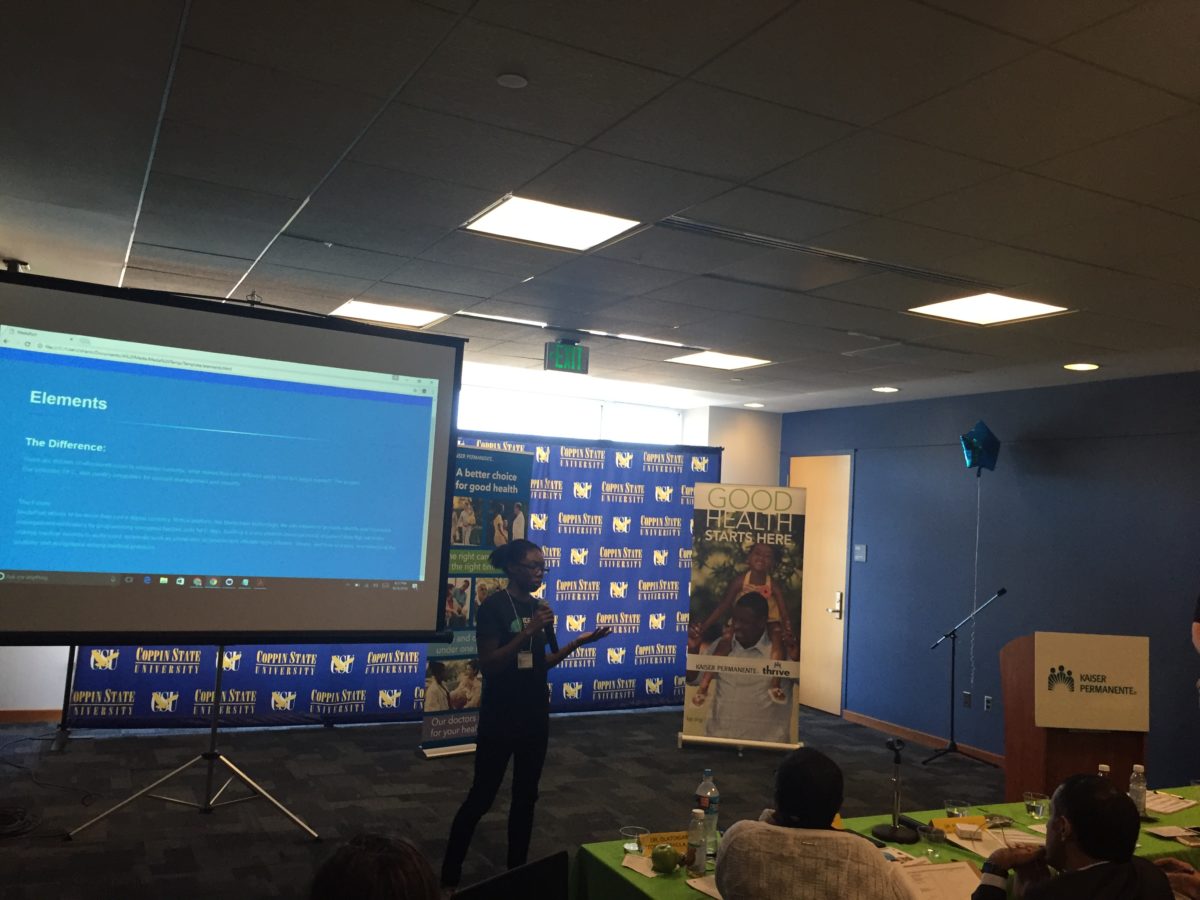Improving access to healthcare, mental health and workforce development is a question of social justice. Can technology provide an answer? And if it can, how do you extend it to those who need it most?
Those were the big questions that the Kaiser Permanente Social Innovation Challenge did not shy away from Sept. 23-24. The event was held as part of Baltimore Innovation Week 2016 presented by 14 West.
For Druid Heights resident Akilah Jackson, answering those questions starts with putting WiFi access in people’s hands via Digital Natives. For Dominic Nell and Steven Johnson, it was about developing MyNiche to help 20-to-24-year-olds identify a career path. And for projects that involved healthcare treatment, helping the uninsured navigate the system was a major consideration.
Kaiser worked with dev event producer BeMyApp, which attracted 17 teams. Held at Coppin State University’s Talon Hall, there was much talk about the mix of attendees. Nearly 100 people were there at the event’s start on Sept. 23, from regional college students with technical backgrounds to activists and public health advocates.
“This has never happened at this scale in West Baltimore,” said Richard May of Innovation Village. He was among mentors that also included members of arts and culture incubator The Living Well, think tank Leaders of a Beautiful Struggle, as well as Microsoft and Kaiser Permanente’s IT team.
Of the more than 25 ideas pitched, the majority were from women and people of color. More than half were Black women, many mentioning that they lived in or near West Baltimore. It was a point of pride, said organizer Destiny-Simone Ramjohn, Kaiser Permanente’s Mid-Atlantic Stakeholder Relations Director.
The healthcare company is also looking to continue to foster innovation through an incubator program. One judge, Jayfus T. Doswell, also pledged to support a pair of the teams through a program called the Juice Accelerator.

Pitching #FightBlight Bmore. (Photo by Stephen Babcock)
On Sunday, 17 projects were pitched to the panel of judges. Here’s a look at several of the ideas recognized with awards:
Here4ReEntry
- Building off of an existing project to compile a toolkit for returning citizens from prison, Kelly King, Donna Boyer and Joseph Cureton created an SMS tool to find access to services through text message. The project won the big prize of $3,000 in cash and a scholarship to the accelerator program.
Eat4Health
- Vadim Polyakov created an app that encourages healthy eating but recommends dishes within a cultural context. Overall, the project was the first runner-up.
MyNiche
- Dominic Nell and Steven Johnson created an app to help people ages 20-24 identify areas where they can gain skills to enter the workforce, and match them to jobs and vacancies. Nell lives in the area, and said he thought of people saying “That’s MyNiche” as he was working on the idea. The project was awarded second runner-up.
Medaport
- Building off of Litecoin, Shannon Foster offered the idea of a new currency to help people pay for healthcare. Along with affordability, the new form of currency would also involve changes that make it easier to understand bills.
#FightBlight Bmore
- Nneka Nnamdi is frequently outspoke on blight in West Baltimore. She led the creation of a tool to streamline the process of reporting issues with vacant structures, including who to call to address appropriate issues and tracking numbers.
Dementia Voicebot
- With Aegle, Krzysztof Sitko created a Bluetooth-enable pendant that syncs with a cellphone to help people stay in communication with loved ones with dementia while they are alone. At the Social Innovation Challenge, Sitko added a bot that talks to a person with dementia using the family member’s voice. “A pre-recorded message of a loved one is more comforting than a voice they don’t recognize,” he said.
Before you go...
Please consider supporting Technical.ly to keep our independent journalism strong. Unlike most business-focused media outlets, we don’t have a paywall. Instead, we count on your personal and organizational support.
3 ways to support our work:- Contribute to the Journalism Fund. Charitable giving ensures our information remains free and accessible for residents to discover workforce programs and entrepreneurship pathways. This includes philanthropic grants and individual tax-deductible donations from readers like you.
- Use our Preferred Partners. Our directory of vetted providers offers high-quality recommendations for services our readers need, and each referral supports our journalism.
- Use our services. If you need entrepreneurs and tech leaders to buy your services, are seeking technologists to hire or want more professionals to know about your ecosystem, Technical.ly has the biggest and most engaged audience in the mid-Atlantic. We help companies tell their stories and answer big questions to meet and serve our community.
Join our growing Slack community
Join 5,000 tech professionals and entrepreneurs in our community Slack today!

The person charged in the UnitedHealthcare CEO shooting had a ton of tech connections

The looming TikTok ban doesn’t strike financial fear into the hearts of creators — it’s community they’re worried about

Where are the country’s most vibrant tech and startup communities?



